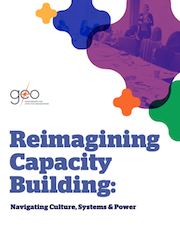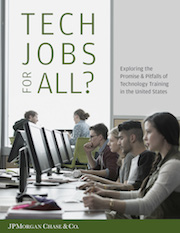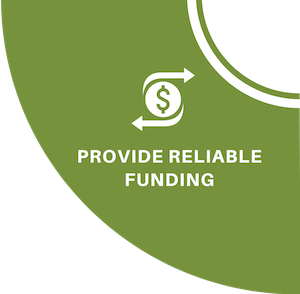Site Search
- resource provided by the Forum Network Knowledgebase.
Search Tip: Search with " " to find exact matches.
A sample document detailing the core values of the Betty and Davis Fitzgerald Foundation including restrictions on participation on nonprofit/grantee boards.
A corporate member asked for what other corporations do regarding employee’s goal and objectives. Do they include volunteerism or volunteer activities as part of an employee’s review, or their annual goals?
Multi-year Grants
Affirmation: Multi-year funds provided both reliability and breathing room for nonprofits.
Making fundamental and long-lasting change comes with the promise of reliable investments. Longer grant terms create an environment where collaborative partnerships can flourish, and trust and transparency break down power dynamics. The result is that nonprofits have the “breathing room” and financial stability to focus activities where they are most needed.
Although many funders award grants to the same nonprofits year after year, they often require submission of annual applications that request information they already have and are complex and needlessly lengthy. These processes can heighten mutual distrust. From a practical standpoint, multi-year awards reduce paperwork for both funder and nonprofit and open communication channels promoting shared goals, mutual trust, and increased overall impact.
Activities
• For funders that historically award repeat annual grants to the same nonprofit partners, shift from an annual grant/proposal cycle to a long-term, multi-year commitment with an annual outcomes/progress report in lieu of a full application.
• Tailor grant terms to suit grantee timelines and needs (negotiated outcomes and milestones).
• If data collection is required solely to meet a funder’s compliance requirements, the funder should assume this responsibility or provide sufficient funding and/or capacity for the nonprofit to meet the requirement.
Short-term Outcomes
• The number of funders making multi-year grants increases by 50% over the previous years.
Long-term Outcomes
• More funders convert an annual application process for repeat grantee partners to a multi-year commitment with an annual outcomes report at the most, instead of full proposals each year.
• Funders assume responsibility for data collection or provide sufficient funding and/or capacity for the nonprofit to meet the requirement.
• Grant terms are suited to grantee timelines and needs (negotiated outcomes and milestones).
How to Begin Doing Good Better on Reliability
Learning opportunities
• What barriers keep funders from making long-term commitments to repeat grantee partners? Are any of these barriers legal?
• What are the minimum data requirements for funders to collect from repeat grantee partners?
Pre-Work
• Address the barriers to awarding multi-year grants through tested tools.
• Learn about how multi-year grants strengthen grantee partners and improve philanthropic, nonprofit, and community impact.
• Research mechanisms funders can use to meet legal compliance requirements while gaining trust in their grantee partners.

In this second session of GCIR’s Anti-Authoritarian Funder Learning Series, we will lean into the wisdom of advocates, pro-democracy funders, and influential thinkers to unpack the patterns of autocratic governance taking hold in the United States, and explore how philanthropy can help avert our democracy’s decline.
While broad swaths of the American public are grappling with the unmistakable and fearful evidence of our authoritarian drift, the good news is that we do not have to go it alone. The backsliding of democratic norms, attacks on civil society, and centralization of abusive executive power is a story that has played out countless times in fledgling and long-standing democracies alike. The brave, strategic, and resilient resistance of everyday citizens in those countries—along with the documentation and analysis of journalists and historians—offers us not just an understanding of the authoritarian playbook (such as vilifying migrant communities to rationalize immigration enforcement), but a roadmap out of it.
Join us as we learn from international advocates, as well as pro-democracy funders and advocates. Together, we will examine the strategies that have been deployed globally against democratic repression—and, crucially, how philanthropy can resource the movement infrastructure needed over the next 18 months to prevent the consolidation of autocratic rule in the United States.

The Fund for Women and Girls of the Princeton Area Community Foundation has awarded a record $325,000 in grants to local nonprofit organizations.
This funding is the largest amount awarded in any cycle of the Fund’s more than 20-year history and includes a first-time award for the Liz Gray Erickson Memorial Grant, a 3-year grant given in memory of the Princeton resident who served as the chair of the Fund from 2012 to 2014.
“Thanks to the generosity and commitment of our Fund for Women and Girls members, we’ve awarded more than $1 million in grants to more than three dozen nonprofits in the last five years,” said Jenifer Morack, Fund Co-Chair.
Fund members pool their donations, then recommend grants to be awarded annually to local nonprofits. Isabel Zisk, Fund Co-Chair, said making a gift to the Fund is incredibly effective. Individual donations create a leveraged pool of funding that greatly benefits nonprofits working to impact the well-being of women, girls and communities in our region.
“We do what no individual donor has the expertise, time or access to do,” she said, explaining that the Fund’s Grants Committee members read dozens of applications and conduct site visits with nonprofits. “Because of some very generous gifts, this year, we have the honor of awarding the Liz Gray Erickson Memorial Grant. With her visionary leadership, Liz planted the seeds of our grantmaking focus.”
TD Charitable Foundation on Monday said it awarded a total of $7 million to 37 nonprofits across the bank’s footprint through the 17th annual Housing for Everyone grant program.
According to the charitable giving arm of Cherry Hill-based TD Bank, “America’s Most Convenient Bank,” grants ranging from $150,000 to $250,000 will support organizations that work to deliver rental assistance, rehabilitate affordable rental housing properties and build organizational capacity to address resident sustainability for the long-term.
As individuals and families across the country struggle with inflation and an exponential rise in rental costs, affordable housing providers face increased hardship, given the growing demand for affordable rental units and emergency rental assistance.
“The affordable housing crisis continues to burden the most vulnerable members of our communities and the organizations committed to supporting them,” Paige Carlson-Heim, director of the TD Charitable Foundation, said. “At TD, we’re committed to doing our part to help create a more sustainable and inclusive future for everyone, and that includes providing access to safe, affordable homes. This year’s grant recipients are mission-critical to that work, and the TD Charitable Foundation is proud to support them in their efforts to create a positive impact and a pathway to housing stability in the communities we serve.”
CNJG’s Finance and Investment Affinity Group exists to keep foundation executives informed as they manage the investment of their corpus. Growth of foundation assets and the active exchange of sound investment strategies is the focus of each program.
As stewards of your organization’s assets, you’ve likely had discussions at the Board level regarding the merits of incorporating Values-Based Investing (“VBI”) approaches into the investment program. As the industry has evolved, VBI incorporates Socially Responsible Investing, Environmental Social & Governance (“ESG”), and Impact Investing. While the opportunity and investment thesis for capturing VBI attributes are well articulated across the industry, a cautious and thoughtful approach is warranted. VBI should not be “one size fits all”; rather, a customized opportunity exists to reflect your organization’s values across the investment portfolio. Further, given the meteoric rise of VBI across the investment industry, there are a plethora of products that claim to incorporate responsible principles; however, a closer examination may raise doubts about the value-add being provided, especially on a net of fees basis. Lastly, certain VBI arenas such as ESG have unfortunately become a hot-button political issue, with both ends of the spectrum equating ESG investing with other political agendas. When considering the appropriateness of VBI for your organization, we believe it is important for the Board to have a clear understanding of the opportunities and challenges involved.
Agenda
8:30 a.m. - Breakfast
9:00 a.m. - Program begins
10:00 a.m. - Meeting concludes
Cost: $35 for CNJG Members; $70 for Non Member Grantmakers (includes full breakfast)
As we know, COVID-19 had a significant impact on student academic achievement. School districts across the state and country are working to accelerate student learning with a particular focus on literacy. Join us for our next Newark Education Funder meeting as we explore how funders can support a community approach to literacy, including the recently released Ten Point Literacy Plan. We will hone in on statewide and local data with the support of a recent study published by JerseyCAN, and then discuss how we can collaborate with grantees on systems that complement the traditional K-12 school day, particularly early literacy and support for reading at home, after-school and community programs, and collaborations with institutions like the Newark Public Library.
Panelists:
Paula White, Executive Director, JerseyCAN
Christian Zabriskie, Director, Newark Public Library
Nayibe Capellan, CEO, Programs for Parents
Catherine Wilson, President and CEO, United Way of Greater Newark
Cost: Free for CNJG Members; $50 for Non Member Grantmakers.
A Virtual Discussion Series to Activate Collective Action
This is a three part series being held March 26, April 30, & May 29 from 2-3:30pm.
In this moment of rapid change and uncertainty, many in philanthropy are scrambling to figure out what to do next. While a handful of foundations have taken swift action to support grantees – including significant moves to increase payouts – there isn’t yet a groundswell of coordinated action. Meanwhile, nonprofits are going into strategy-and-survival mode to keep their work afloat as our communities face unprecedented challenges.
Amid all this confusion, one thing is clear: philanthropy has a critically important role to play in this moment. As many leaders are pointing out, now is the time for philanthropy to lean into trust-based principles and rise up in solidarity with nonprofits that are working on the front lines of every issue facing our communities. While trust-based philanthropy was not designed as a crisis response strategy, it is exactly in these moments when this approach can be leveraged for impact.
Join the trust-based philanthropy community for a virtual discussion series as we break down insights and recommendations for how funders can meet this moment to support the strength and resilience of our communities. Over time, we have built a collective movement of funders who see the inherent value of partnering alongside nonprofits to meet the needs and dreams of our communities. Now is the time for us to tap into our collective power to ensure that we can weather this storm together.
Register using the above link. Once your registration has been reviewed you will receive a calendar invite to save the dates. A Zoom link will be provided closer to the session's date.
Late last year, the Texas legislature passed a series of bills targeting migration at the Texas-Mexico border. This included Senate Bill 4 (SB4), which criminalizes anyone suspected of crossing the border without authorization to enter or re-enter into Texas. Since then, a series of legal decisions have created confusion and uncertainty. Similarly, Florida has passed legislation targeting community IDs and driver's licenses for immigrants and criminalizing the transportation of undocumented immigrants into the state.
As battleground border states, Florida and Texas have had an immense influence across the country, as other states have stood up similar anti-immigrant bills. Most recently the governor of Iowa signed SF2340, a bill which made it a state crime for immigrants with prior deportation orders from the U.S. to reside in the state. The Louisiana governor recently introduced SB 388, which, as in Florida, criminalizes undocumented immigrants entering or reentering the state. Meanwhile, Georgia has introduced legislation to punish local governments for having sanctuary city policies.
In an election year when immigration is the top issue in the minds of many voters, these policies exacerbate xenophobic, anti-immigrant, and racist sentiments that further dehumanize and criminalize immigrant and refugee communities while also expanding state powers to detain, deport, and terrorize undocumented individuals. To respond to this moment, organizations are leveraging different strategies–from litigation to organizing–to prevent the implementation of these policies and create a more welcoming country for all.
Join us for a panel conversation with frontline leaders, which will be followed by a funder-only discussion.
Speakers
Jennefer Canales-Pelaez, Texas Policy Attorney & Strategist, Immigrant Legal Resource Center (ILRC)
Erica Johnson, Founding Executive Director, Iowa Migrant Movement for Justice (Iowa MMJ)
Dauday Sesay, Founder & Executive Director, Louisiana Organization for Refugees and Immigrants (LORI) & National Network Director, African Communities Together (ACT)
Moderator
Cairo Mendes, Senior Director of State and Local Programs, GCIR

